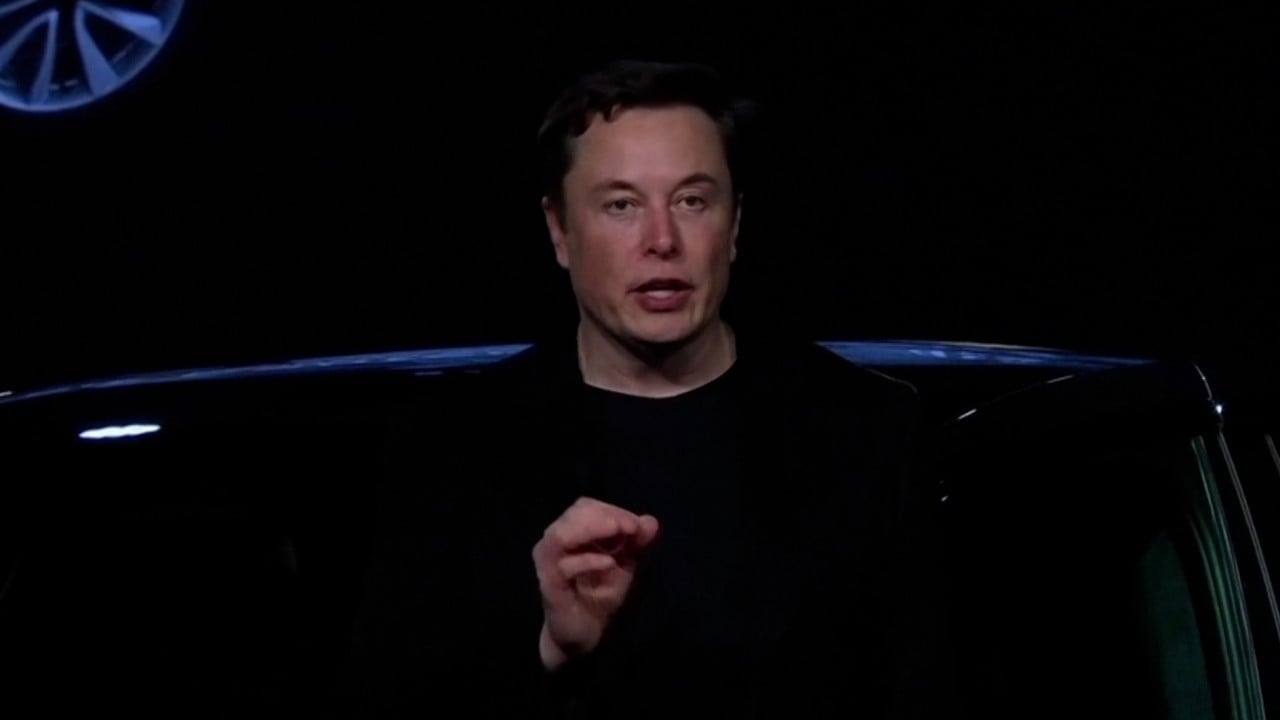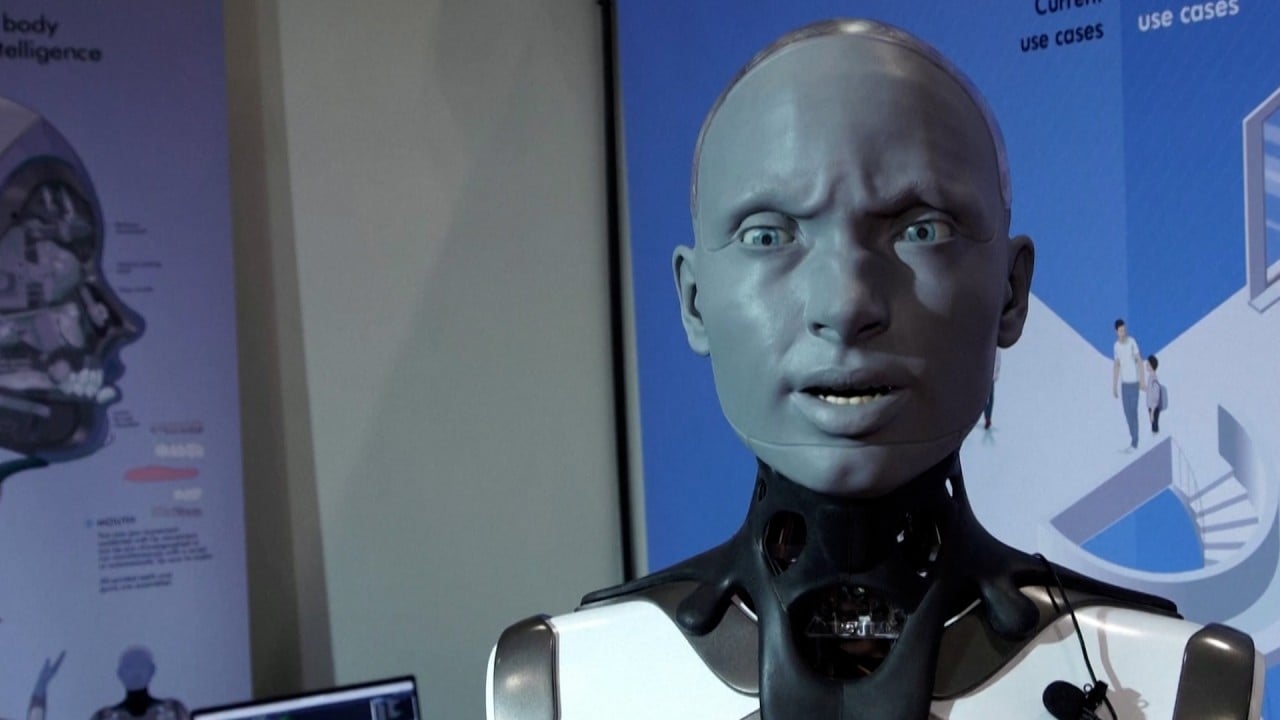Global Impact: US-China tensions raise AI stakes, complicating an already messy tech war
- Global Impact is a weekly curated newsletter featuring a news topic originating in China with a significant macro impact for our newsreaders around the world
- In this edition, we look back at the World Artificial Intelligence Conference (WAIC) and provides the latest on the ever-developing world of AI

Global Impact is a weekly curated newsletter featuring a news topic originating in China with a significant macro impact for our newsreaders around the world. Sign up now!
Ready or not, artificial intelligence is coming, and it is reshaping the US-China tech war that has evolved over the past five years.
This fact was on full display at China’s largest conference dedicated to the tech, the World Artificial Intelligence Conference (WAIC), which took place in Shanghai earlier this month.
While the event attracted all the biggest domestic players, a single foreign sponsorship – from mobile chip designer Qualcomm – illustrated just how strained things have become for US tech giants trying to operate in China. The last conference before the pandemic in 2019 had IBM, Microsoft and Amazon Web Services as sponsors.
This year’s conference at least had one big foreign public figure who could make headlines: Tesla and SpaceX CEO and embattled Twitter owner Elon Musk. This may not be particularly surprising. With Tesla’s Shanghai Gigafactory being instrumental to its global supply of electric cars, Musk has immense business interests in China. In an eight-minute speech, Musk’s enthusiasm for Chinese AI was on display.
“China is going to be great at anything it puts its mind to. That includes … artificial intelligence,” he said at the conference.
In a conversation on Twitter, Musk also said he believes China is on “team humanity” when it comes to AI development, although Republican congressman Mike Gallagher disagreed, saying they acted more like they were “team genocidal communism”.
Some US tech firms made low-key appearances, including representatives from Apple, Amazon and Microsoft. Still, much of the conference was a who’s who of China tech, with all the names you are likely familiar with. Sanctioned tech giants Huawei and SenseTime were sponsors, alongside Tencent, Ant Group and Alibaba, owner of the Post.
AI has long been an area of interest for Beijing, which in 2021 specified it as one of seven “frontier technologies” to develop. The surge in popularity of ChatGPT, which launched in November, has since kick-started a new AI race, and it exposed how far behind China was in one particular area of the field: large language models (LLMs).
At WAIC, vice-minister for industry and information technology Xu Xiaolan said China is developing an AI value chain from “smart chips and algorithm frameworks to industry-specific large language models”.
Sceptics have raised questions of whether censorship would impede China’s development of generative AI, as the creativity of bots like ChatGPT relies heavily on ingesting a wide swath of content and producing unique, sometimes unexpected responses to queries. We covered that in a previous edition of Global Impact.
But over the last several months, Chinese tech firms have been pouring resources into developing their home-grown LLMs and rolling them out in applications for consumer and commercial use. China now has more generative AI start-ups than any other country, reaching 22 by the end of the first half of the year, compared with 21 in the US, according to one Chinese research firm.
Much of the country’s AI activity is happening in Beijing, which is home to about half of China’s 80 LLM.
By the time WAIC rolled around this month, companies were eager to show what their work has wrought. Many exhibitors were showing off their own ChatGPT-like products catering to several different industries, including logistics, education, finance and construction.
On the question of content controls affecting machine learning, Beijing believes it is a challenge that can be overcome. On Thursday, seven Chinese regulators introduced the world’s most detailed regulations on generative AI, a provisional document that requires related products to “adhere to core socialist values” and encourages the generation of “positive, healthy content”.
Also this month, the Ministry of Industry and Information Technology set up the China Electronics Standardisation Institute to establish LLM standards, and it enlisted the help of tech giants Baidu, Huawei, 360 Security and Alibaba.
As with many new technologies, state media has warned of both risks and benefits of AI. In late June, the People’s Daily said AI poses risks related to intellectual property rights, privacy and fraud, but it also said the technology would be “an important driving force” to “industrial transformation”.
The head of the Cyberspace Administration of China also said last month that AI must be “reliable and controllable”.
Big Tech has taken the hint. Alibaba’s outgoing CEO, Daniel Zhang, who will remain head of the company’s cloud computing unit, emphasised regulatory restraint in a speech last month.
“Hitting the accelerator while also … hitting the brakes for security are equally important,” he said, using a metaphor that suggests the industry could be in for a bumpy ride ahead.
Chinese tech firms have more than just regulations to contend with, of course. US restrictions on advanced chips used for AI applications are still in place and escalating, with reports that Washington is weighing restrictions on the use of cloud AI services.
Some Chinese firms believe they have an edge in at least some areas. Baidu said the latest version of its Ernie Bot has surpassed ChatGPT in certain tasks conducted in Chinese.
Going beyond the domestic market could be more difficult, but Hong Kong believes it could be a conduit for that. The city’s financial secretary, Paul Chan Mo-po, made an appearance at WAIC, where he touted Hong Kong’s strength in science and education. After his trip, Chan blogged that the government “received a lot of positive responses” about attracting investment from the mainland.
Going global could be easier said than done for Chinese firms these days, though. Musk might be “pro-China”, as he put it in his Twitter chat, but it is clear he is swimming against the political tide in his home country in that regard.
60-Second Catch-up
Deep dives
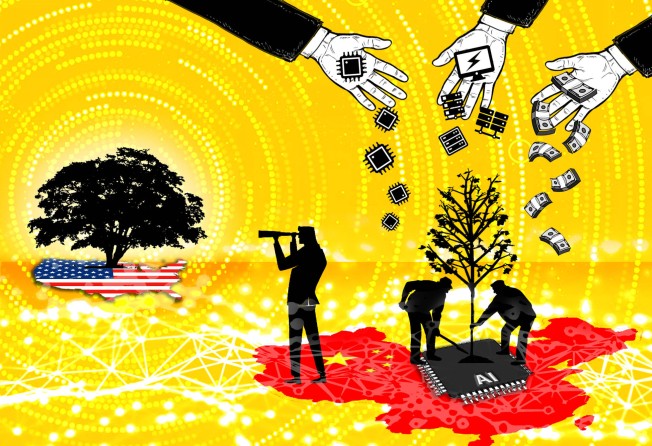
Will AI be China’s ace in the hole to surpass the US and become the top economy?
-
China’s internet giants Baidu, Alibaba and Kunlun have been quick on the uptake after ChatGPT was unveiled last year, adding to the conflict in the US-China tech war
-
It has long been suggested China will overtake the US as the world’s largest economy, but its weak recovery from the impact of the coronavirus has raised doubts
When the San Francisco-based OpenAI unveiled ChatGPT to the market in November, hailed as the so-called iPhone moment for artificial intelligence (AI), it cast a shadow across the Pacific.
China’s internet giants, though, have been quick on the uptake. Baidu launched its Ernie bot in March followed by Alibaba Cloud and Kunlun’s Tiangong in April. Alibaba is the owner of the South China Morning Post.
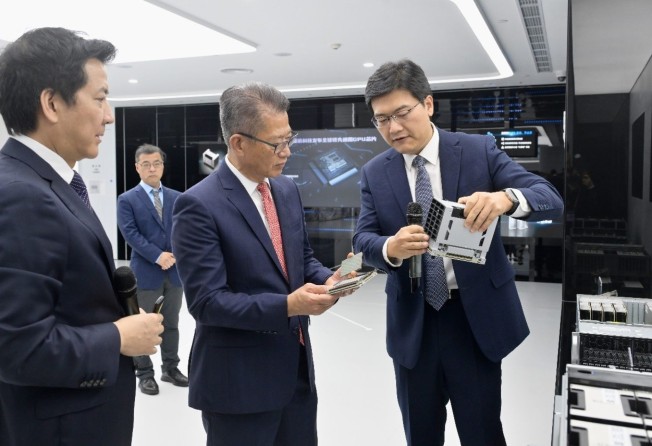
Hong Kong’s Paul Chan hints at ‘goods news’ after Shanghai trip to woo top tech enterprises
-
Finance chief says start-ups and technology firms in Shanghai expressed enthusiasm about using Hong Kong as gateway to expand into global market
-
‘I believe that there will be some good news in the short term about attracting strategic enterprises, Chan says, but stops short of revealing details
Hong Kong’s finance chief has hinted at “some good news” after a recent visit over the border to entice leading technology companies, saying some businesses had expressed a strong interest in setting up shop in the city.
Financial Secretary Paul Chan Mo-po on Sunday said he had met some representatives of start-ups and technology enterprises on a trip to Shanghai and that the companies were considering expanding into global markets through Hong Kong.
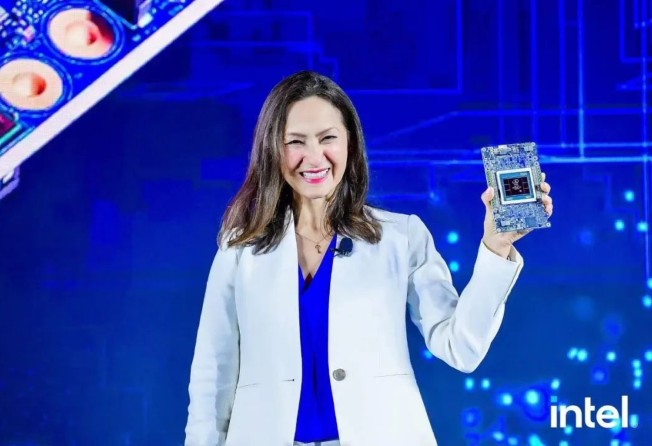
Tech war: Intel and Nvidia continue to push purpose-built chips for training AI systems in China amid US export restrictions
-
Intel said its Gaudi2 processor, which is not subject to US restrictions, is the company’s answer to Nvidia’s A100 GPU, used for training AI systems
-
It follows efforts by Nvidia earlier this year to push modified versions of the firm’s US-restricted A100 and H100 GPUs in China
Semiconductor giant Intel Corp has brought its latest processor for artificial intelligence (AI) deep-learning applications to mainland China, where massive demand for US-restricted advanced chips has created a major under-the-counter trade for smuggled graphics processing units (GPUs) from Nvidia Corp.
At a press conference in Beijing on Tuesday, Intel executives presented the company’s Gaudi2 processor, a device that is not subject to US export restrictions, as its answer to Nvidia’s premium A100 GPU, which is widely used for training AI systems.
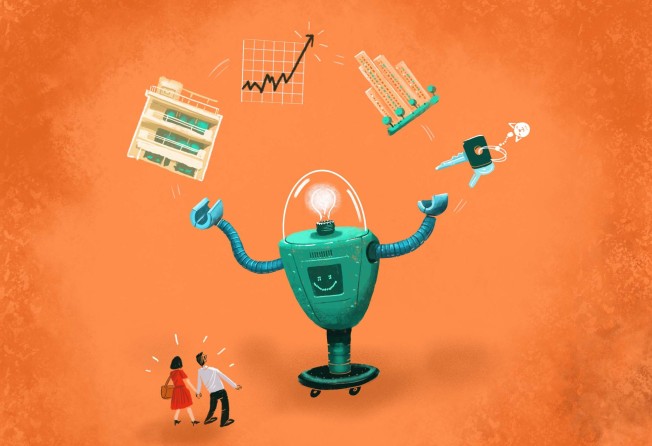
AI won’t replace property agents soon, but ChatGPT is still altering their jobs
-
An age of experimentation is under way as real estate companies invest in artificial intelligence to explore its advantages and limitations
-
AI looks set to absorb some drudge work, freeing agents to focus on building relationships and providing valuable counsel, experts say
In a city of the future, a citizen looking to buy a home will simply explain their requirements to an artificial intelligence (AI)-based assistant, which will orchestrate the entire selection and buying process without a human property agent – or the commissions such agents command.
Well, maybe.

‘I was running out of time’: sci-fi author Liu Cixin writes speech using ChatGPT
-
The Hugo Award-winning author of The Three-Body Problem said he turned to ChatGPT because he was running out of time to write a speech
-
Chinese Nobel laureate Mo Yan had earlier revealed that he used ChatGPT to beat writer’s block and help him craft a speech
China’s most famous science-fiction writer, Liu Cixin, said he used ChatGPT to help compose his recent public speech, which reinforced his belief about the potential of the artificial intelligence (AI) chatbot to replace certain human activity.
“ChatGPT, of course, will make an impact on human existence and society, but its influence won’t result in AI-ruled humans like what happens in science fiction,” Liu told Michael Yu Minhong, founder of New Oriental Education & Technology Group, in a live-streamed interview on May 31.

AI-generated hits of Hong Kong stars surprise fans, bring dead singers back to life and raise questions about copyright
-
Using generative AI, content creators can reproduce voices and styles of stars, fooling even devoted fans
-
Only flesh-and-bone performers can interact with audience, band and dancers on stage and convey emotions. AI is just technology, singer says
Hong Kong cult icon Wan Kwong was astonished when Cantopop songs supposedly sung by him became hits with listeners recently, thanks to the use of artificial intelligence.
YouTube content creators used AI to generate his voice before integrating it with two songs – “Solitude” by songwriter Terence Lam Ka-him and “My Dear Friend” by Keung To of Hong Kong boy band Mirror.

Will world’s first global AI regulation summit ‘freeze out’ firms from Asia?
-
Experts say pegging regulations to countries like the UK – due to hold a global AI summit – could ‘freeze out’ firms from nations like China or India
-
What’s right for the West when it comes to regulating the multibillion-dollar industry ‘isn’t necessarily right for Hong Kong, Singapore’, they say
British Prime Minister Rishi Sunak announced this month that Britain will host the world’s first global summit on artificial intelligence safety later this year, with “like-minded” Asian countries and companies set to take part in discussions on regulating the rapidly developing technology before it is too late.
The move comes as lawmakers in Europe recently signed off on the world’s first set of comprehensive rules for AI, adding to a growing chorus of calls for global regulation that shines a light on the efforts of Asia’s tech hubs.
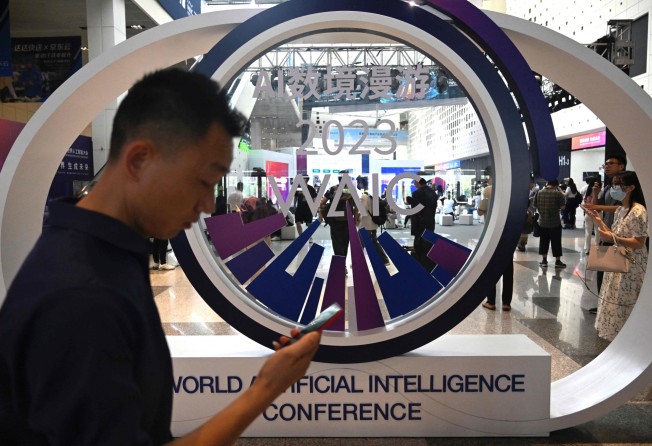
China asserts AI development goals at Shanghai conference as Beijing braces for potential new US tech restrictions
-
Official says China aims to build a complete AI value chain, from ‘smart chips and algorithm frameworks to industry-specific large language models’
-
The Chinese government is expected to increase its support for the local AI industry, which is estimated to consist of more 4,300 companies at present
This year’s edition of the World Artificial Intelligence Conference (WAIC) in Shanghai opened on Thursday with Chinese government officials presenting a unified front on pushing the country’s AI development ambitions, despite the threat of potential new tech restrictions by the United States government.
China’s Vice-Minister for Industry and Information Technology, Xu Xiaolan, said in a keynote speech at the conference, which concludes this Saturday, that the country is moving to develop a complete AI value chain that covers “smart chips and algorithm frameworks to industry-specific large language models (LLMs)”.
Global Impact is a weekly curated newsletter featuring a news topic originating in China with a significant macro impact for our newsreaders around the world.
Sign up now!
